#i believe it's old english for 'the castle below'? or it might be welsh i think 'caer' is welsh for castle
Text
the name "cair paravel" is maybe my favourite thing about the narnia books. something about it is just so beautifully mysterious and makes me think of fairy glens and rose-covered bowers and ruined palaces all grown over with ivy. it sounds like words you might hear in a dream
#i believe it's old english for 'the castle below'? or it might be welsh i think 'caer' is welsh for castle#but i don't even really care about the translation#it just Sounds Nice#if it was a colour it would be lilac or maybe sea-foam green#be shh now
67 notes
·
View notes
Text
Battle of Mortimer’s Cross.
After reading several accounts of the battle of Mortimer’s Cross over the years this one stands out. It is far from what might be called academic and probably contains historical errors. Nevertheless, it brings the Battle to life. It concentrates on the people and places not the military strategy or political background. There are probably better sources if that is what you seek. Historians are consistent in recording how little is known about this battle when compared with other Wars of the Roses events. It is more than ‘Historical Fiction’ and give a sense of time and place.
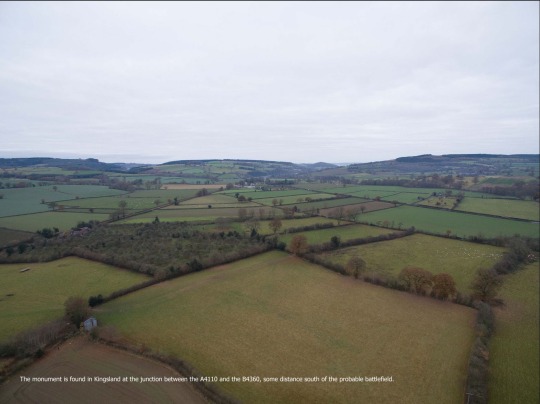
If you prefer a more academic but no less entertaining account of the battle then read the following. It is no less interesting and almost certainly more accurate.
The Civil War of 1459 to 1461 in the the Welsh Marches: Part 2 The Campaign and Battle of Mortimer's Cross – St Blaise's Day, 3 February 1461
by Geoffrey Hodges
http://www.richardiii.net/downloads/Ricardian/essay_civil_war_1459_1461_mortimer.pdf
Background
Upon the death of the Duke of York at Wakefield the previous December, the Yorkists were led by his 18-year-old son Edward, now 4th duke of York.[4] He sought to prevent Lancastrian forces from Wales, led by Owen Tudor and his son Jasper, Earl of Pembroke, from joining up with the main body of Lancastrian forces. The elder Tudor had been second husband to Catherine of Valois, widow of Henry V; their sons, as Henry VI's half-brothers, had been made earls, and the family became a major power in South Wales. His army included Welshmen, drawn especially from the area of the Tudor lands in Carmarthenshire and Pembrokeshire, along with French and Breton mercenaries and Irish troops led by James Butler, Earl of Wiltshire and Ormond.[5] Edward, based at Wigmore Castle had gathered his army from the English border counties and from Wales. Among his leading supporters present were Lord Audley, Lord Grey of Wilton, Sir William Herbert of Raglan, Sir Walter Devereux and Humphrey Stafford.[6] After spending Christmas in Gloucester, he began to prepare to return to London. However, Jasper Tudor’s hostile army was approaching and he changed his plan; so as to block Pembroke’s advance and block him from meeting up with the main Lancastrian force which was approaching London, Edward moved north with an army of approximately five thousand men to Mortimer’s Cross. Source; wikipedia
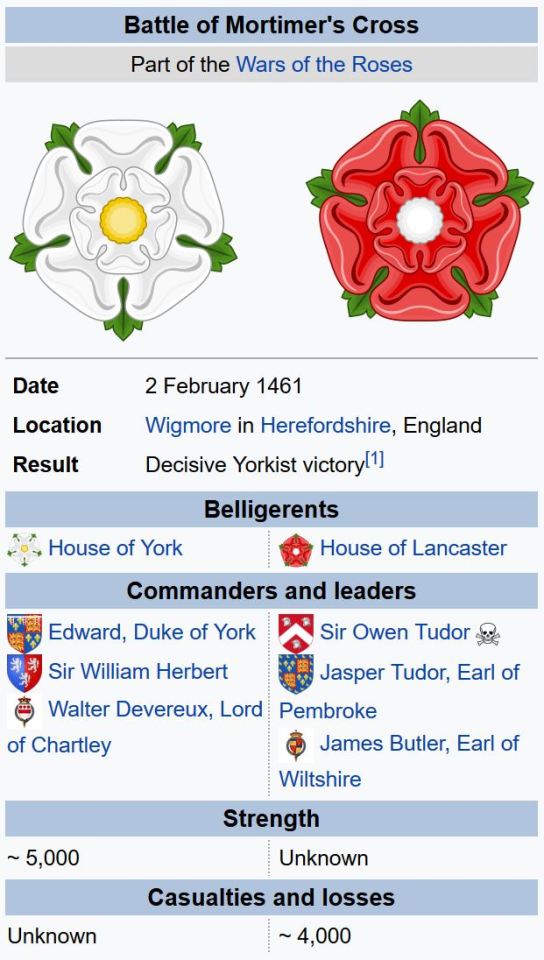
Source;
Malvern Chase: An Episode of the Wars of the Roses and the Battle of Tewkesbury, an Autobiography
Edited By W S SYMONDS
Published by William North and Simpkin Marshall, Tewkesbury and London (1881)
MALVERN CHASE was first published in 1880 and its popularity was such that six editions were printed within ten years. Although William Symonds subtitled it as an `autobiographical' account of the Wars of the Roses, it is in reality a superb historical reconstruction supported by much documentary evidence.
The medieval romance not only satisfied the Victorian liking for all things gothic, whether in architecture, furniture, or painting, but, as a story of masculine derring-do, feminine fidelity, and ghostly portent, it also followed the literary fashion of the time.
The author's descriptions of the Malvern Hills and the Vale of the Severn, at a time when they consisted of forest, heath, and marsh, paint an appealing picture that provokes a yearning for those less crowded times, even if life was much more uncertain. The populist support for the Witchfinder to sniff out those experimenting with herbal remedies has a resonance with a latter-day suspicion of scientific research.
The book has been out of print for many years and this new edition revives for a twenty-first century reader its effective characterisation, breadth of scholarship, and lively narrative.
BATTLE OF MORTIMER’S CROSS.
We found the Welsh village of Presteine occupied by Yorkist troops sent forward from Wigmore, and a messenger was awaiting us from my father telling us to push on and join him there. We saw on our march Pylleth Hill, where the Earl of March gave battle to Owen Glendower, and after a desperate struggle was defeated and made prisoner. The scene of the personal combat between these renowned chieftains was below this hill, on the banks of the river.
I burned with impatience once again to meet my father, but no sooner had we arrived at Wigmore than we found he had moved southwards to join Duke Edward.
Wigmore Castle is built on the site of a stronghold as old as the time of Edward the Elder; and we admired the grandeur of the castle with its massive keep, situated amidst scenes of picturesque beauty. Long before we reached it we could hear the din and clangour of armed men, and outside the castle was a large village occupied by retainers, the dwellings situated upon a sloping rock and intersected by ravines. Hundreds of men-at-arms were in troops around the castle, while others were marching southwards towards Hereford, their steel caps and morions sparkling in the setting sun.
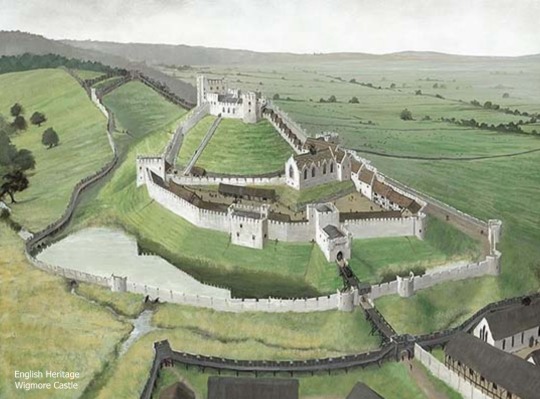
"Who goes there?" shouted a hoarse voice as we rode up to the drawbridge of the castle, and the reply, "Robin of Elsdune," seemed to be a sufficient password.
Robin now dismounted and spoke anxiously to the warder, who informed him that the widowed Duchess of York, and her sons, George and Richard (afterwards the Dukes of Clarence and Gloucester), were within the walls for safety; that an attack by the Welsh army under the Tudors was hourly expected, and yet the assembled forces were leaving to meet Duke Edward, trusting to the strength of the place, and the garrison, to keep it against all corners.
We then rode down the slippery paths to the village, where large wooden sheds afforded shelter for man and horse for the night, and arranged that our troops should be well cared for, and ready to saddle at a moment's notice. This done, Robin invited me to accompany him to an interview with the widowed Duchess of York, to present her with a token and message from her son, the Duke. We crossed a ravine to the eminence on which the castle is situated, and, on Robin again giving the password, we were conducted to the keep, a massive square palace, in which was lodged the widowed Duchess.
The great square was crowded with men-at-arms, with several domestics clad in mourning, and to one of these Robin addressed himself, showing the gold chain which he occasionally wore. In a few minutes the servant re-appeared and summoned us to the presence of the widowed lady.
Knowing that Duke Edward was nearly twenty years of age, I was surprised to see his mother so young and so beautiful. Clad in the deepest mourning, with golden hair and lovely blue eyes, it was hardly possible to believe her to be the mother of that manly sop, and yet the likeness was strong, for Edward had nothing of the "swarthy Mortimers" about him, and resembled his mother, yet without a shade of effeminacy.

The Duchess received Robin with more than courtesy, it was the welcome of a trusted friend, and as he knelt and pressed her hand to his lips, the tears flowed down her cheeks. On his telling her my name, she extended her hand to me to kiss, saying that she had heard from Lord Edward the good service I had rendered.
In the meantime Lord George had seized upon Robin, and was showing him a new bow and a wooden battle-axe, but the Duchess had explanations to receive from the Archer, so she called him on one side, and left me to entertain the boy and his little brother, Lord Richard.
Lord Richard was dark and swarthy like his father, with an inclination to high shoulders; his face was handsome, but his form was then feeble, and I little thought that I should behold him leading the most terrific charges at the battle of Theocsbury, or that he would become a knight renowned for feats of valour and of arms. Even then, as he sat upon my knee, he insisted on showing me "Robin's swing" with the battle-axe, much to the danger of my head, and his brother's also. Lord George had flaxen hair, and a weak expression of countenance.
The Duchess now addressed me, and noticing the ring on my finger, the gift of her eldest son, she said the service must be good that won such a token of his regard, as it was her own gift on his natal day. She also alluded to my interview with Lord Warwick, at his castle at Hanley, and I fancied a shade crossed her countenance as she spoke of him, for, notwithstanding the predilection of her husband and her son Edward, she never altogether trusted this powerful and somewhat unscrupulous Baron.
It was now time for us to take our departure, when the Duchess inquired if we thought she was safe from the raids of the Welshers within the walls of the castle, or if she should take sanctuary in the Abbey. To this Robin replied that "there were Marchmen to meet Welshers, and it would be difficult for all the Welshmen in Wales to penetrate to the stronghold of Wigmore Keep."
We now made our salutations, and took our departure, Lord Richard entreating us to take him with us, and once again practising the "Robin swing" at my devoted knees.
"Is not that a lady a man may die for?" said Robin, as we reached the bottom of the staircase. He now inquired for the Captain of the Archers within the walls, and, showing his golden chain, gave some brief directions which that leader appeared to accept without questioning. "We must now," he said, "make for the Abbey!"
The Abbey of Wigmore is distant nearly a mile northwards of the castle, and here lie buried the remains of the illustrious Mortimers from the times of Ranulph, who, having vanquished Edric Sylvaticus, Earl of Shrewsbury, received from the Conqueror himself the extensive possessions and immense estates which belong to this royal house. When we reached it, masses were being said for the souls of Duke Richard and his son.
Wigmore Abbey.
Wigmore Abbey was an Augustinian abbey with a grange, from 1179 to 1530, situated about a mile (2 km) north of the village of Wigmore, Herefordshire, England: grid reference SO 410713. Only ruins of the abbey now remain. Source; wikipedia
It was from his ancestors, who lie buried within the walls of this Abbey, that Edward of York inherited such decision of character that no sense of personal danger, and no tie of kindred, could ever turn him from the attempted accomplishment of a purpose once determined on, and I pondered, as I stood among the graves of this proud family, who never seemed to shrink from any violence to gain their end, if such was to be the character of the youth who, if success attended upon his arms, might one day be King of England.
My cogitations upon the Mortimers past and present were abruptly broken by the sound of a war trumpet outside the Abbey walls, and I found that some two hundred archers from the castle and village were assembled, and prepared to follow Robin of Elsdune, fully confident in his knowledge of the country, and his sagacity as a leader. In the meantime the Archer had sent a message to Tom of Gulley's End, and our own men-at-arms and horses had arrived at this trysting place. Robin spoke in Welsh to the archers, and I could perceive that he was giving precise directions for their guidance.

In the meantime, the Welsh borderers from the forest of Radnor and Kington had attacked the van ahead of us, and again the shouts and oaths of battle rent the air. In the narrow trackways it was only now and then that our riders could act and charge, but Robin and his archers seemed everywhere, and I could hear his long, keen, bugle blast now in the woods and thickets, and now in some copse, from which his men poured their arrows on the flanks of the Welsh forces. Nor did the Welsh forget their wonted bravery. They rushed upon their unseen foes into the churchyard and up the knoll, but only to meet death from the unerring shafts. With wild and terrible clamour, the whole army had now turned back, and closed in tumultuous throng round the village of Brampton Brian. Again and again we attacked them with our little body of horsemen, but some billmen threw themselves under our horses, and I had soon lost a dozen of our best troopers, while several fought on foot, having had their horses killed under them. I now saw that it was useless continuing this unequal strife, so, shouting to my dismounted men to ride behind their companions, we fought our way foot by foot out of the throng, and made for the village of Leintwardine, which had been appointed for our rendezvous and retreat. Soon afterwards the Archer joined us there, having lost only ten of his men, while the Radnor troops who attacked the van had retired towards Wigmore, Jasper Tudor having had a narrow escape of being taken prisoner. Our point had been gained, the whole Welsh army was now in full retreat to Knighton.

We now left the village, which in the morning we found in peace and tranquillity, and in the evening was crowded with the dead and dying. The moon had arisen as we rode into the village of Wigmore, and lit up the standard of York and Mortimer as it floated high above the keep of the noble castle.
Being well-nigh exhausted, I did not awake until after cock-crowing next morning. Robin had already looked to the horses and their riders, and was conversing with a scout who had arrived from Knighton, full of the rage of Jasper Tudor at the retreat of the whole army, owing to the ambush and attack of a few hundred men. His father, Owen Tudor, was with the horsemen of the rearguard, and had been dismounted, so that it was his charger Robin rode back to Wigmore.
It was now the intention of Jasper Tudor to await fresh forces from Clun, and then march upon Hereford, without attempting to besiege the Castle of Wigmore, hoping to crush Duke Edward before he could receive aid from the Earl of Warwick.
We found the gracious Duchess had already heard of our success the day before, and we received her dignified congratulations. She then gave us communications she had received from her son, Duke Edward, who had intended first marching to Ludlow, but, from the tidings he had received from our advanced outposts, was now determined to march to meet the Welsh army. He had sent word to the troops under my father, Sire John de Guyse, Sire Herbert of Crofts, Sire Howell Powell, and other leaders, to join their forces with his on the line of the trackway between Kington and Leominster; and he left to his trusty follower, Robin of Elsdune, to organise, as he best could, a force at Wigmore, which might hang upon the rear of the Welsh army as they advanced from Knighton and Clun.
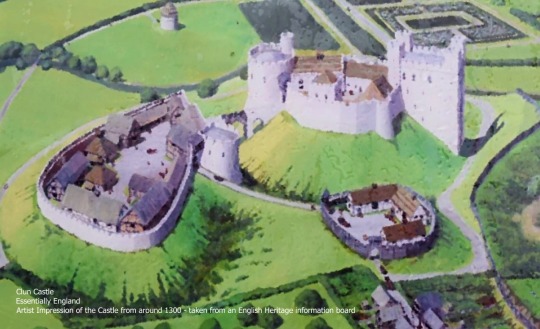
Two whole days we now passed within the Castle, during which we collected a considerable number of veteran dependents of the house of Mortimer, who had seen many a bloody field, but whose bows and spears had been laid against their cottage walls, as if their days of adventure were over. But these hours of leisure soon passed away, and a messenger arrived from Duke Edward's camp on Kingsland Field to inform us that he should await there the onset of the Welsh, while a scout from Knighton brought the tidings that Jasper Tudor had this time led his army by Presteine. His army was calculated at over twelve thousand men, but a large proportion were badly armed, and but few armour-bearing knights in the field.

In less than an hour the archers and men-at-arms of Wigmore were assembled in the great courtyard, when the Duchess herself bade us God-speed. Leaving a sufficient garrison for the Castle, we were soon in full march for Avemestry, the village whither my father and the Lord of Crofts had marched the day we arrived at Wigmore. It was nearly dark when we reached this village, and learnt that all the troops collected there had moved to Kingsland, where Duke Edward had set up his standard, surrounded by his whole army, with the exception of our reserves.
Billmen
The bill is a polearm weapon used by infantry in medieval Europe. The bill is similar in size, function and appearance to the halberd, differing mainly in the hooked blade form. Bill-men were English soldiers who were armed with the bill.
The dawn of the morning of Candlemas Day (1461) aroused us from our rough quarters in the village of Avemestry, and before the sun had risen we had marshalled our troops. I then rode for the camp of Duke Edward, to communicate to him our exact position with three hundred good men and true, and the arrival of the Welsh army on the hills of Shobdon. As I rode forward on a sturdy pony, with "Roan Roland" led behind me, the fog cleared from the valley, and the gloom was passing into a morning's twilight, indicating the rising of the sun. Suddenly a wailing voice rose among the hills, and a noise as of people stamping came through the air; my companion said it was the "creening of the Welsh," and, on listening to the mysterious sounds more attentively, I heard distinctly the warlike notes of the Welsh march I had heard on the harp in the great hall of Hergest.

Hergest Court.
Manor house, now farmhouse and sub-divided into two tenements. Reputed to have been built c1430 for Thomas Vaughan; on the site of an earlier house but largely remodelled during the C17 and C18 and further altered during the C20. Part sandstone rubble and part close-studded timber framing with wattle and daub infill, part shingle clad (to south-east side) Welsh slate roof. Source; https://historicengland.org.uk/listing/the-list/list-entry/1081747
The sun rose as I rode upon the field of Kingsland, when a magnificent sight met my astonished eyes. At the eastern extremity rose the pavilion of Duke Edward, above which waved the Plantagenet banner, and on the right and left were the tents of the knights and gentlemen who were now gathered together in front, while a flourish of trumpets announced that the Duke and his retinue were now sounding to horse. Duke Edward was arrayed in splendid armour, across which hung a rich golden baldric studded with silver roses. Behind him were two heralds, and pursuivants clad in their peculiar livery.

In front of the pavilions were drawn up in battle array some 6,000 foot and archers, all armed with bows or cross-bows, and pikes, or short double-edged swords, while troops of horsemen galloped across the field. Among the various groups I recognised the flags and devices of many esquires and gentlemen who led their vassals and tenants in this quarrel. Here floated the Swan of De Guyse, and my heart beat when I saw on the far left the red Talbot of De Brute. On the right was the Dolphin of Howell, and the devices of Scudamore, Baskerville, Bromwich, and many others.
Sire John de Guyse rode by the side of the Duke, and his dark complexion and deeply marked features were a strong contrast to the fair face of the distinguished youth, who looked as much a king's son as the other a tried warrior.
The Duke's quick and stern eye, for no one had a sterner eye in battle, glanced towards me as I rode up on the gallop. He gave me a look of recognition and approbation, while he bid me wait until he had discussed some points in question with the knights around him.
The chivalrous spirit of Duke Edward urged him to challenge Jasper Tudor, the Earl of Pembroke, to the ordeal of personal combat, to be waged first with the lance or battle-axe, and afterwards with swords and daggers, until the death of one or other of the combatants. None of the knights to whom he referred encouraged the idea, as, whoever might gain the victory, battle between the forces, now so near to each other, would be certain to ensue. The Duke was not to be persuaded, so it was determined that I should carry his challenge, accompanied by one of the heralds.
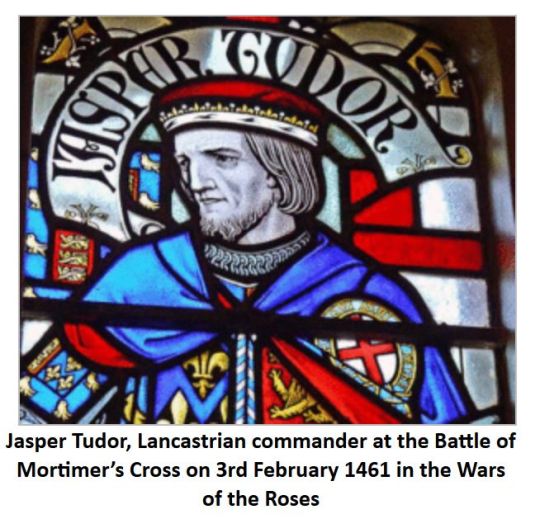
The heads of the Welsh columns were now seen advancing on the western side of the great plain; they displayed a few banners, and as there was little doubt that the Earl of Pembroke led the van, the Duke commanded me to lose not a moment, but to ride with the herald bearing a white flag, and to give his solemn challenge to deadly combat. The herald rode in front, displaying the white banner, and I followed, riding slowly across the plain, passing several corps of men-at-arms, until we reached a knight cased in bright steel armour void of ornament, with the exception of a collar of the order of St. David of Wales. His herald displayed the banner of the Earl of Pembroke. The knight's visor was up, and he had a dark sullen look and a swarthy complexion. On his left hand rode an elderly knight with visor up, whose good-humoured expression contrasted forcibly with the stern bearing of Lord Pembroke; his helmet was bruised and dinted, and behind him rode a pursuivant with the banner of the Tudors. The face was that of one who had been extremely handsome in his youth, and indeed it was that face and form which had attracted Catherine of France, the widowed Queen of Henry V.
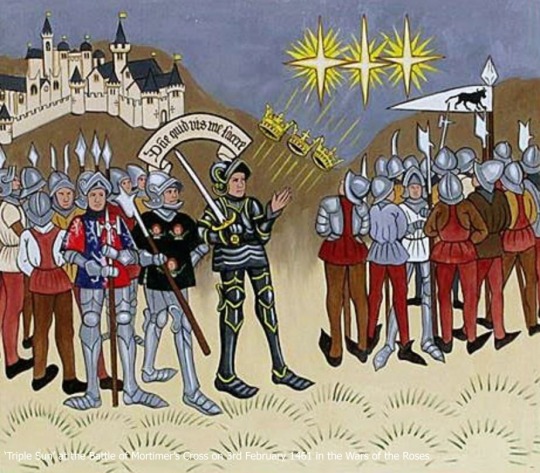
I had little time for observing more, as the Earl of Pembroke rode forward to receive the message from Duke Edward of York. On the herald's proclaiming the challenge to mortal combat, first by sounding his trumpet, and then in a loud voice, I rode up and threw a mailed glove of the Duke's in front of the charger of Jasper Tudor. His pursuivant was about to raise it from the ground, when the Earl shouted to him to let it lie, and said in response, "Return, Sir Esquire and Sir Herald, to your master, and say that Jasper Tudor declines to meet a beardless boy with sword and lance. Such questions are not to be settled by the death of babes or infants, but by the valour of bearded men. It were better for him to return to the care of his mother until mayhap we drag him thence to answer for being in arms as a traitor to our Lord the King!"
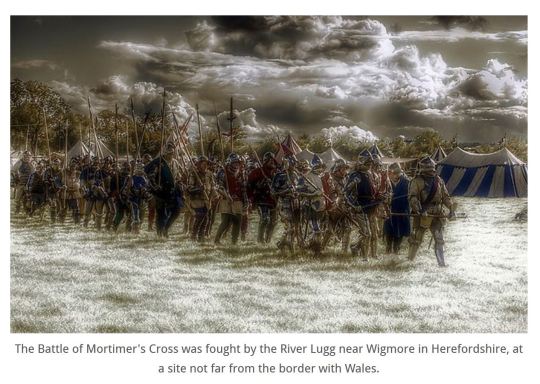
Enraged at this want of courtesy to my noble master, I said something about the fall of knighthood and of honour, when I was told by a knight near at hand to ride back from whence I came and bear a civil tongue lest perhaps I might return with cropped ears and a slit tongue to them that sent me. I turned to hurl an angry defiance in the teeth of the speaker, when I saw, underneath a bassinet or steel cap which had no visor, the heavy features and sinister countenance of Sire Andrew Trollop. Shaking my gloved fist in his face and shouting "Traitor!" I gave the spur to "Roan Roland," not a moment too soon, for at a loud signal of this treacherous knight a shower of arrows followed me, and my days would have been numbered but for the good shirt of mail I wore beneath a leather jerkin. Fortunately my horse was uninjured, and the herald was untouched.
Duke Edward received the reply from the herald, given in somewhat modified terms, in silent contempt, but he was much exasperated at the traitorous and un-knightly attack upon his esquire.
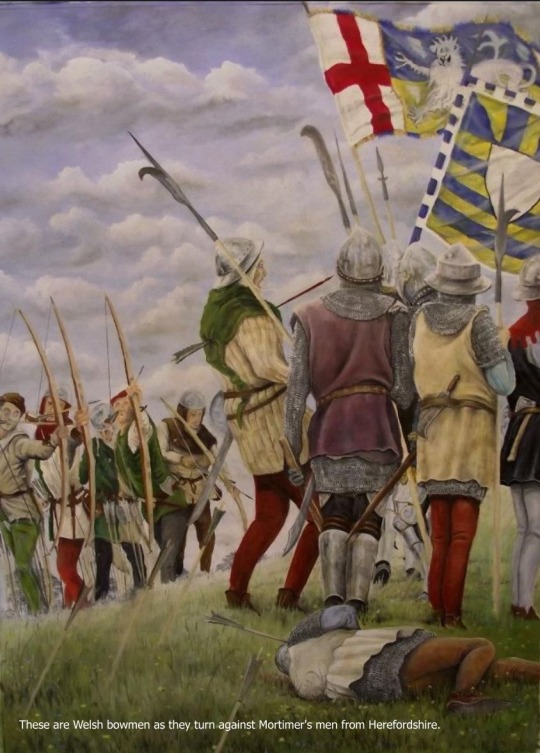
The sun had now risen above a dark bank of clouds, which stretched across the eastern sky, and we witnessed a strange appearance in the heavens, which I have never seen before or since. Some say it was a "delusion" caused by the clouds, others say it was a "miracle," but the sun rose as three separate suns, each as large as the other, and so continued for the space of half-an-hour. The appearance was hailed by the shouts of our assembled army, also by the loud cries of the Welsh forces, who were still marching on to the western plain.
How little had I realised the scenes on a field of battle! I had imagined that we should shoot flights of arrows and advance pikes, and charge with knights and mailed men on war-horses, and cut and slash, and wield our battle-axes, and the battle would be won; but the field of Kingsland was obstinately contested from sunrise to sunset, and every yard of ground was fought for, for hours together.
It was a slow, surging, struggle for life and death, varied by occasional charges of horsemen and knights as the leaders thought fit, and I have ever thought that, had it not been for the clear head and splendid qualities, as a general, of the youth the Earl of Pembroke sneered at as an "infant," the battle would have been lost by us. Although Duke Edward evinced great personal courage whenever there was a sign of the troops giving way, he remained standing for an hour at a time, giving directions through his esquires, and watching the movement of every corps. At the close of that long and eventful day he exposed his life again and again in terrific charges into the very thickest of the Welsh forces. Neither did he ride his war-horse during the earlier part of the day, but galloped to and fro on a stout palfrey to various parts of the battle-field, directing attacks or repelling the onset of the ever-advancing Welsh, who at one time nearly surrounded us; nor was I, or the other esquires, engaged in the mêlée for some hours, not until towards the close of this great struggle, as we were engaged in carrying messages and rallying the weary; neither did I ride "Roan Roland", or he would have expired from sheer exhaustion before the fight was over. He was led, like the Duke's charger, behind the great pavilion, and I rode across the field again and again, on a stout Welsh pony, till he was killed under me, and then I ran or walked until I caught another, there being no lack of steeds without riders.
It all seems to me now as a misty dream, of trumpets sounding, of shouts of men raving and dying, of horses and riders charging and being overthrown, of archers shooting and bows clanging, of pikemen thrusting, and falling in heaps of slain, of a hell let loose upon earth, and of being utterly worn out with weariness at the end.
During the whole of this long day, I never once saw my beloved father; he had been sent by Duke Edward to bring up the left wing half-a-mile to the left of the pavilion, whereas my duties kept me continually engaged on the right. I rode twice into the village of Avemestry, and the last time I had to climb the crest of the hill above to take a message to Robin of Elsdune, to keep our reserves hidden until strict orders from the Duke himself, or, if he was killed, from Sire John de Guyse. Indeed, it was the reserve led on by Robin that won the battle for us at last.
It was well-nigh four o'clock on that Candlemas evening that fresh Welsh troops poured down from the hills of Shobdon along the Kington trackway. The principal struggle was near a small stream, which traverses the Kingsland plain, where hundreds of the forces of both sides had fallen. Here was Sire Hugh Calverley killed, and many a Welsh knight and gentleman on the side of the Lancastrians, and here was taken prisoner Owen Tudor himself. Here lay Baskerville of Erdisley, Roger Kitel of Pendyke, and Howell of Pengethly, among heaps of slain, and here were still fighting De Guyse, Herbert of Crofts, and others, with the numbers of their men-at-arms sadly diminished, and many utterly exhausted with their long and apparently useless efforts.
Duke Edward bade me now gallop to Avemestry and order Robin to advance with his reserves of fresh and unexhausted men, and to attack the Welsh on their left rear, and this time I rode "Roan Roland." Brave as they were, the Welsh could not withstand this final charge. The advancing archers of Wigmore poured flight after flight of arrows upon men who had not an arrow left. Then came the pikemen with their sturdy thrusts, and the charge of the horsemen with sword and battle-axe.

The scene was now terrific! Duke Edward ordered the whole lines of horse and foot to advance for a last and final struggle; and across the stream, over dead and dying, the English forces advanced, amidst the roar of the conflict, and the stentorian shouts of Robin's troops. It was now that Duke Edward charged with his band of knights and gentlemen, and I saw him gallop into the midst of the throng, and fight his way towards the standard of Jasper Tudor, shouting his war-cry of "A York! a York!" man after man falling under his battle-axe, and the weight of his barbed steed.
Many of the Welsh, though in dense throngs, were borne to the earth by the barbed horses, others were hewn down by the mailed riders, while some actually clung round the legs of the horses and stabbed them in their bellies with daggers or knives.
The combat was thus raging, when I saw Duke Edward's horse totter and reel, and shouting "De Brute to the rescue!" in a few moments I was in the midst of the fight around the Welsh standard. Man, to man was now the combat; no cry for quarter, and in a short time a frightful carnage ensued. Of the scenes enacted, and of my own share in them, I remember very little. I only know that, when it was over, I found myself well-nigh exhausted, with my battle-axe broken, and my left hand grasping a mace which turned out to be that of the Earl of Pembroke. I then saw Duke Edward standing close by me, having been dragged from underneath his dying horse. I heard him say, "The day is ours! they fly!" and bidding me kneel there among the heaps of the slain, he laid his sword gently across my shoulders, and said, "Rise up, Sire Hildebrande de Brute, you have saved my life a second time."
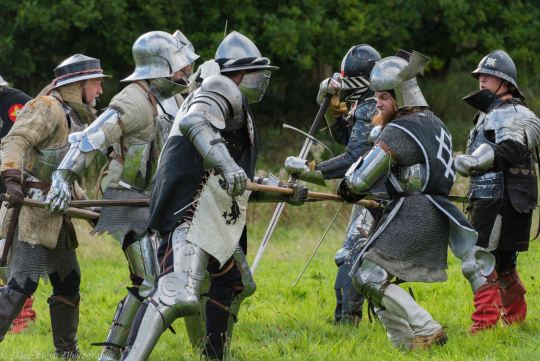
But the combat was not yet over. Duke Edward mounted a fresh horse, and again dashed amongst the retreating Welshmen, shouting to me to follow him; but it was not easy to do so, for noble Roland had seen his last field, and there was no horse near. I therefore joined a band of archers and followed with them on the track of the retreating Welsh. Again, they turned at bay at a place called Kinsham dingle, and fought like bull-dogs of the staunchest breed. I was thoroughly exhausted when I came upon a stream of water and having taken off my steel morion and laid aside my battle-axe, I knelt to drink. Before I could rise, I saw Sire Andrew Trollop, who had hidden in the bushes of the dingle, rush forward from behind an oak. I felt that it was all over me, and, commending myself to God, I threw up my hand with the steel bonnet, to protect my head. I remember no more save that my eyes gave forth sparks of fire, as I sank beneath the coward's blow.
Morion
A morion is a type of open helmet originally from the Kingdom of Castile (Spain)[1], used from the middle 16th to early 17th centuries, usually having a flat brim and a crest from front to back. SOURCE; Wikipedia
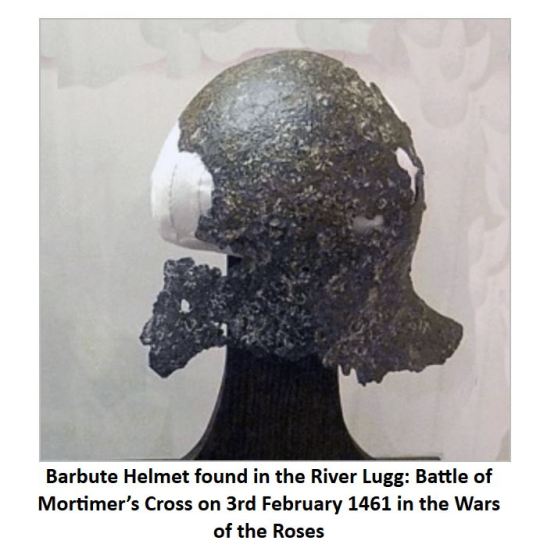
When sense and memory returned, I found myself lying in a small room, on a couch, on which shone the blessed light of the sun, and directly in front of me, sitting at the foot of the bed, was the pale, wan face of Mary Bolingbroke. On my attempting to rise, she pressed her forefinger to her lips to indicate silence, and entreated me to lie quiet, as my life depended on it. She then gave me a draught of some potion, and I sank into a refreshing sleep with the happy consciousness that I was tended by friends.
In due time I was allowed to sit up awhile, and ask questions, when I learned that I was at Elsdune; that I had been rescued in Kinsham Dingle by Robin and Tom of Gulley's End, and that, although apparently dying, the former insisted upon having me borne upon a litter to his own home, and, although himself wounded, had never left the litter side until he had seen me safe under the care of Mary and his sister Deborah.
Kinsham
On either 2nd or 3 February 1461 the Battle of Mortimer's Cross was fought downstream from Kinsham. In the aftermath of the battle Lancastrian soldiers retreated up the river Lugg and were trapped where the river gorge narrows at Kinsham. Local folklore states the river ran red with the blood of the soldiers when they were killed
My first inquiry was for tidings of my father, who, through all that fierce day on the field of Kingsland, I had never once seen, as he was engaged on the extreme left, and I was continually on the right and in the centre, as esquire to Duke Edward. I had no sooner asked the question than I saw from the expression of Mary's face and the little sob she could not control, that my father was dead.
For some time I relapsed into unconsciousness, and remember little save a pressure at my heart and a choking in my throat, for my father had ever been to me as a loving elder brother and beloved friend.
Then succeeded a kind of dream, and I was back with him in memory fishing together in the old moat at home, or rambling over hill and glen among the Malverns, or listening to his wise words under the shade of the elms, or by his side in the panelled chamber among the scrips and parchments, and I longed once more to hear his kindly voice, and to say to him, "Bless me, oh my father!" when there came across my mind the numbing, certain feeling that I should never hear that voice again, and I remembered the Shadow of the Ragged Stone as I beheld it with Rosamond, hanging over our home.
The relation of personal sorrow, and a tedious illness, have but little interest to others, so I shall merely say that, after a long struggle between life and death, I recovered sufficiently to sit at the window, when I knew by the cawing of the rooks, and the song of the storm-cock and the blackbirds, that spring was about to renew the buds and flowers, and that the long nights of winter were passing away.
Sire Robin of Elsdune--for he, too, had been knighted on the battle-field--still wore his right arm in a sling, was my constant companion, at least as much as Mary Bolingbroke would allow him, and never tired in showing the many kindnesses the sick and weary-hearted can best appreciate.
My first inquiry, now I had again rallied, was for Rosamond; what brought her to Hergest; where was she during the battle; what had become of her, and where was Master Vaughan, whose pennon I had seen flying at the great struggle round the standard of the Tudors?
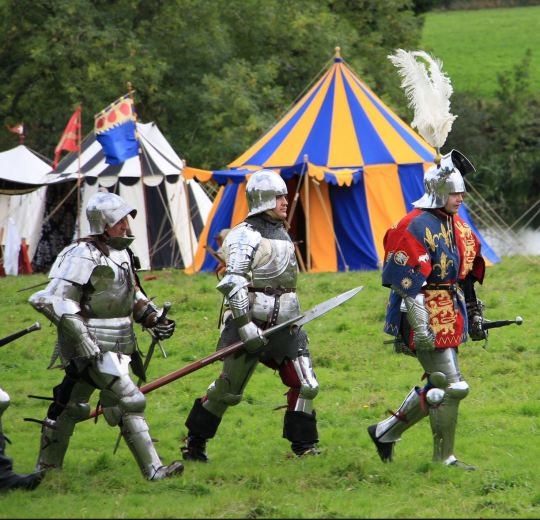
Mary Bolingbroke then reminded me that Master Vaughan had married the only sister of Mistress Berew, which I had forgotten, if indeed I ever knew it, for old Master Berew being a Lollard and Master Vaughan a strict Catholic, they had not met for years.
Lollard
Lollard, Lollardi or Loller was the popular derogatory nickname given to those without an academic background, educated (if at all) only in English, who were reputed to follow the teachings of John Wycliffe in particular, and were certainly considerably energized by the translation of the Bible into the English language. By the mid-15th century, "lollard" had come to mean a heretic in general.
The Master of Hergest was a widower and childless, and from time to time inquired after his niece's welfare and the way in which she was brought up. Hearing of the rallying of the Yorkists at Gloucester, he expected raids and plunderings would take place between the contending forces in that neighbourhood, and so judged that Berew would be no safe place for a young and motherless girl. He therefore undertook the journey, and persuaded Master Berew to allow Rosamond to pass some time at Hergest, which, situated as it is in the wilds of Radnorshire, he little expected would be so near the scene of battle.
During the battle of Mortimer's Cross, Rosamond was in safety in Clun Castle, and her uncle had escaped after the defeat, but whither no one knew, for neither he nor Rosamond had returned as yet to Hergest, which had been well searched by riders from Wigmore as the stronghold of a bitter Lancastrian. Indeed, it was through Robin's influence that it was not committed to the flames.
Neither had Master Vaughan's prospects improved. The great battle of Towton had been fought, and Duke Edward had ridden royally into Westminster, followed by an immense train of people shouting "Long live King Edward!"
The hopes of the Lancastrians seemed shattered for ever; Henry of Lancaster was a fugitive somewhere in the wilds of Yorkshire, and Margaret of Anjou and her son Prince Edward were wanderers with large sums offered for their apprehension.
After a time I was enabled to stroll about among the woods of Elsdune and Lynhales, and to admire the grand scenery of the valley of the Wye, the mountains of Brecon and Hay, and the hills of Kenderchurch, Tibberton, and Foxley, as they rose in the noble panorama in front of Robin's home. On the right rose the vans of Brecon capped with snow, and below the dark headland of the Black Mountains were the castle and village of Hay. Near to Hay is Clifford Castle, once the home of "Ye fair Rosamond." Then nearer to us and in the vale rose the great Keep of Erdisley, the home of the Baskervilles, and bordering on the Cummy moors, the haunt of wild cattle and big boars. Just opposite we see the Keep of Almeley, and in the distant vale the ever-winding Wye. Neither was I uninterested in his fish stores, and devices for keeping the trout and grayling in waters ponded for piscatoria. Tame stags would eat from Deborah's hands, and near were woods where Mary Bolingbroke could wander without fear or hindrance, the forests of Kingswood and Lynhales.
Eisdune, the old grange where Robin was born, is an unpretending dwelling, but right comfortable withal, and furnished with many modern luxuries, which the master had introduced through his long associations with the Mortimers. If the modest hall was small, it was hung around with valuable trophies of the Archer's skill, and the bed furniture of the dormitories was of the best. Nowhere were there such pillows of goose-down and such mattresses of bog myrtle or bed straw as those of Mistress Deborah. Nowhere were there such salted junk and deer's flesh, or such confections and preserves of honey.
But the days passed by, and I was most anxious to return to Birtsmereton, knowing how my widowed mother was affected by my father's death, and how she had been prevented by dire sickness from attending upon me her only child. But health and strength will not return as we wish it, and my head had been so badly injured that all at Elsdune insisted on my remaining a little longer.
Again I was most anxious to learn something of what had happened to Rosamond, and if possible to find out where she had taken refuge with Master Vaughan, and persuade them both to return home with me to Worcestershire, which was now far safer than the borders of Radnorshire, where hundreds of fugitive soldiery were prowling like hunted wolves in the forests.
As soon, therefore, as I could mount a horse, I determined to ride over to Hergest and try if I could not learn, by the aid of some silver pieces, somewhat about the location of Master Vaughan and his niece. Mary Bolingbroke insisted upon accompanying me, as also did our friend Robin. Indeed, this was necessary, in order that the Welsh domestics might be interrogated in their own language.
On our arrival at the great Grange we found all deserted with the exception of one old gardener, Evan Evans, or as he called himself, "Ivvan Ivvans," who was plodding among the herbs in the garden. Wonderful to say, he could speak English, so while Robin and Mary went to some of the tenants' houses hard by to make inquiries respecting the master, I remained with "Ivvan," resting on the steps of the sun-dial and enjoying the spring sunshine in the front of the quadrangle.
While talking to him about the fair visitor who had some time since ridden away with his master, I closely scanned the windows of the apartments which opened into the quadrangle, but nowhere did I recognise the crenelle belonging to the chamber where I had passed that terrible night with the dog "Vulcan" lying dead under the arm-chair.
I then changed the subject from "Hergest apples" and "Mortimer pippins" to the subject of dogs, and inquired if "Ivvans" ever accompanied his master to the chase, and if they still possessed the breed of the celebrated Hergest boar-hounds.
The word boar-hound was enough! The old man grounded his prong, and, shaking his head, said, "Better not talk, sir, about the Hergest tykes, or you may see one of them suner nor you loikes." I then told him that a well-known bull-dog of the neighbourhood which had followed me had died in one of the bed chambers under very peculiar circumstances. Here the old man gave a low whistle, and raising himself up said, "It would have been odd if he hadn't." Then he looked about him tremulously as if he had said too much.
I encouraged him to go on, when, peering into the gorse thickets which came up close to the quadrangle as if he expected some apparition among them, he pointed to a narrow crenelle half hidden by ivy, and said, "Is it there ye slept?" I replied that was about the position as far as I could tell; when he muttered, "Then it's not much sleep ye had, for that's the Black Dog's room, and the room in which his master died." I tried with all my powers of elocution, backed by a piece of silver, to extract more of the history from the old gardener, but he only peered nervously into the glades around, and then, resuming his prong and digging, said, in a low tone, "The less said the suner mended."
Robin and Mary Bolingbroke now returned from their investigation among the franklins and tenantry, but they had learned little save that Master Vaughan, accompanied by his niece, had been seen taking the road from Clun Castle to Abbey Cwm Hir, which had already been the sanctuary of many of the unfortunate refugees among the defeated Lancastrians; so we had to return without learning more of her in whom my happiness was now more than ever concentrated.
0 notes